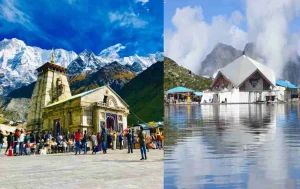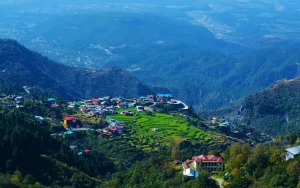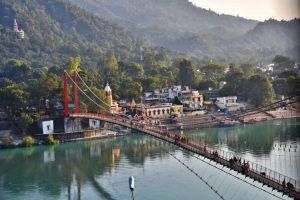A major political controversy has engulfed Uttarakhand following revelations about the allocation of a prestigious Uttarakhand tourism project at the historic George Everest Estate near Mussoorie. The dispute centres around allegations that Acharya Balkrishna, co-founder of Patanjali and trusted aide of Baba Ramdev, held shareholdings in all three companies that participated in the bidding process for this lucrative tourism venture.
The Uttarakhand tourism project has become a flashpoint between the ruling BJP and opposition Congress, with serious questions raised about the transparency and fairness of the tender allocation process. The controversy has intensified calls for an independent investigation into what critics describe as a potentially fraudulent arrangement designed to benefit a single entity.
 Also Read: Uttarakhand tourism project
Also Read: Uttarakhand tourism project
Other: Nepo Kids Spark unrest
Leader of Opposition in the Uttarakhand Assembly, Yashpal Arya, has demanded a thorough probe into the Uttarakhand tourism project allocation. Speaking about the allegations, Arya emphasised that only a committee headed by a retired judge or a Central Bureau of Investigation (CBI) inquiry could uncover the truth behind the tender process.
Arya’s concerns stem from the unusual circumstance that all three bidding companies for the Uttarakhand tourism project were allegedly controlled by the same individual – Acharya Balkrishna. This revelation has raised serious questions about the competitive nature of the bidding process and whether it was designed to create an illusion of competition while ensuring a predetermined outcome.
The opposition leader had previously raised concerns about potential revenue losses during the budget session, questioning how a 142-acre property of such strategic importance was leased for merely Rs 1 crore annually to Rajas Aerosports and Adventures Pvt Ltd, one of the three participating firms.
The financial aspects of the Uttarakhand tourism project have drawn particular scrutiny from critics. According to government rates, the 762 bigha land parcel has an estimated value of approximately Rs 2,757 crores. Market analysts suggest that commercial land values, especially in prime tourist locations, typically command prices four to ten times higher than government rates.
This valuation discrepancy has intensified questions about whether the state government received fair compensation for leasing such valuable real estate. Critics argue that the annual license fee of Rs 1 crore appears disproportionately low considering the property’s strategic location and commercial potential.
Adding to the controversy is the revelation that the government took a Rs 23 crore loan from the Asian Development Bank to improve and develop the land before handing it over to the successful bidder for 15 years. This investment raises questions about why taxpayer money was used to enhance the property before its allocation to private entities.
The Chief Minister’s Office has strongly defended the Uttarakhand tourism project allocation process, maintaining that all procedures were conducted with “full adherence to regulations.” Official communications emphasise that various tourism services are now operational at George Everest Estate, including Himalayan view programs, bird watching, astro-tourism, cultural events, museum operations, and parking facilities.
The government response highlights that helicopter services are also being operated on designated routes with complete regulatory compliance. Officials stress that while operational and maintenance responsibilities have been transferred to the private entity for 15 years, the land ownership and assets remain with the Tourism Department.
This arrangement, according to government officials, ensures that the state retains ultimate control over the property while benefiting from private sector efficiency in operations and tourist service delivery.


The BJP’s defence focuses on the developmental outcomes achieved through the Uttarakhand tourism project. Party representatives argue that the site has now become a significant source of economic activity, contributing to the state’s tourism revenue and employment generation. They contend that critics are spreading negativity about legitimate development initiatives.
However, BJP representatives have not directly addressed the core allegation that all three bidding companies shared common ownership through Balkrishna’s shareholdings, leaving this crucial aspect of the controversy unresolved.
The Uttarakhand tourism project at George Everest Estate currently encompasses multiple tourism activities designed to maximise the site’s potential. The location’s historical significance, combined with its panoramic Himalayan views, makes it an attractive destination for both domestic and international tourists.
Current operations include specialised programs for nature enthusiasts, cultural events that showcase local traditions, and modern amenities like helicopter services that provide aerial tours of the region. The establishment of the George Everest Museum adds educational value to the tourist experience.


The controversy surrounding this Uttarakhand tourism project raises important questions about transparency in government contracting processes, particularly in the tourism sector, where public assets often have substantial commercial value. The allegations highlight the need for robust safeguards to ensure competitive bidding processes that serve the public interest.
The case also highlights the importance of using proper valuation methodologies for government properties leased to private entities. Critics argue that the current arrangement may have resulted in significant revenue losses for the state.
The Uttarakhand tourism project controversy continues to generate political heat, with fundamental questions about process transparency and financial propriety remaining unresolved. While the government maintains that all procedures were followed correctly, opposition demands for an independent investigation reflect serious concerns about the fairness of the allocation process.
The ultimate resolution of this controversy will likely have lasting implications for how future tourism projects are structured and allocated in Uttarakhand, potentially setting precedents for transparency and accountability in government contracting processes across the tourism sector.

